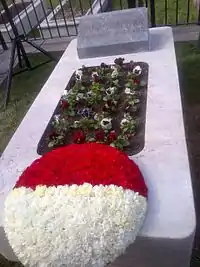Galip Balkar | |
|---|---|
| 27th Turkish Ambassador to Yugoslavia | |
| In office 1 November 1981 – 9 March 1983 | |
| President | Kenan Evren |
| Preceded by | Hikmet Özkan |
| Succeeded by | Ali Hikmet Alp |
| Personal details | |
| Born | 1936 Istanbul, Turkey |
| Died | 11 March 1983 (aged 47) Belgrade, Yugoslavia |
| Alma mater | Ankara University |
| Profession | Diplomat |

Galip Balkar (1936 – 11 March 1983) was a Turkish diplomat. He was assassinated by two Armenian gunmen in 1983 during his duty as the Turkish ambassador to Yugoslavia.
Life and career
Galip Balkar was born in 1936 in Istanbul. He graduated from Ankara University, Law School. In 1959, he joined the Ministry of Foreign Affairs. He was appointed the Ambassador of Turkey to Yugoslavia in 1981.
Assassination
Two Armenian gunmen opened fire with small firearms[1] at the ambassador's car, which stopped for a red light at a major downtown intersection in Belgrade.[1] Balkar, 47, and his chauffeur Kaya Necet were wounded, the condition of the ambassador being critical.[1] Two Yugoslav security agents in the area chased them and shots were exchanged.[1] The gunmen wounded one of the agents, Slobodan Brajević. Another shot aimed at Brajević had ricocheted off a wall and slightly wounded an office worker, Zorica Solotić.[2] A Yugoslav student, Željko Milivojević, was killed during the exchanged gunfire.[3]
The attackers were arrested and identified as Harutyun Krikor Levonian and Alexander Elbekyan. They had arrived in Yugoslavia from Beirut on 6–7 March and both held Lebanese passports.[2] Levonian, seriously wounded, was caught shortly after the attack, and Elbekyan eight hours later. The same day, an anonymous caller to The Associated Press in Athens took responsibility for the attack on behalf of the Justice Commandos of the Armenian Genocide a militant organization that was blamed for at least a dozen attacks on Turkish targets from 1975 to 1987.[1] Callers to other news outlets in Paris and Beirut also said the Justice Commandos had carried out the assault. The messages said the shooting was intended to draw the world's attention to what the group called "the national problem of the Armenian people."[1]
See also
References
- 1 2 3 4 5 6 Graham, Bradley (10 March 1983). "Gunmen Wound Turkish Envoy to Belgrade". Washington Post.
- 1 2 Assassination of Turkish Ambassador to Yugoslavia, Summary of World Broadcasts, BBC Written Archives Centre: BBC, March 14, 1983
- ↑ De Waal, Thomas (2015). Great catastrophe : Armenians and Turks in the shadow of genocide. Oxford. p. 155. ISBN 978-0190904784.
{{cite book}}: CS1 maint: location missing publisher (link)